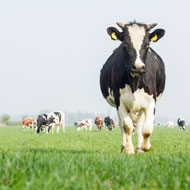Vets welcome NI plans to prosecute BVD offenders

“We welcome this announcement and hope that it will motivate the small number of herd keepers who continue to keep untested animals to comply with the legislation" - Aurelie Moralis, BVA NI Branch president.
Vets have welcomed a move by Northern Ireland’s Department of Agriculture, Environment and Rural Affairs (DAERA) to take enforcement action against herd keepers who breach the testing requirements of the Bovine Viral Diarrhoea (BVD) eradication programme.
Under the new plans, herds with significant numbers of untested animals born before 1 March 2016 (when compulsory testing began) will be contacted and will have 30 days to have their animals tested. Failure to do so may result in prosecution.
Aurelie Moralis, president of BVA Northern Ireland Branch, said: “The introduction of compulsory BVD testing in 2016 has proved very successful in moving Northern Ireland towards our ultimate goal of being BVD free. The majority of farmers are already engaging well with the process to control BVD. However, the success of the eradication programme relies on the commitment and compliance of every herd keeper in Northern Ireland.
“We welcome this announcement and hope that it will motivate the small number of herd keepers who continue to keep untested animals to comply with the legislation. We encourage vets to remind their clients that BVD testing is both advisable and compulsory and that failure to comply may now result in prosecution.”
Chief veterinary officer Robert Huey said: “Since BVD testing became compulsory we have seen a significant drop in the prevalence of BVD, however, it is disappointing that a small number of herd keepers continue to keep untested animals. Some of these are likely to be persistently infected with BVD virus so they are a disease risk, both to the current herd and to neighbouring herds.”
He continued: “BVD eradication is dependent on herd keepers being aware of the status of their animals and taking appropriate action. The Department has a responsibility to ensure the legislation is adhered to and we will seek to enforce this through the courts if necessary.”



 The Federation of Independent Veterinary Practices (FIVP) has announced a third season of its podcast, Practice Matters.
The Federation of Independent Veterinary Practices (FIVP) has announced a third season of its podcast, Practice Matters.